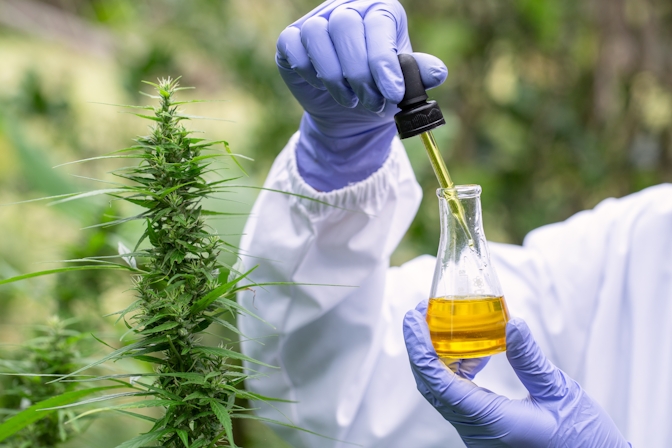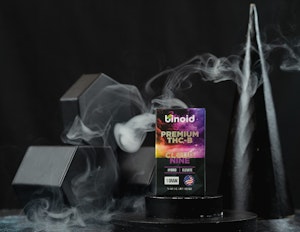
Photo by Keti Chikhladze, @immigrantstoner
What Is THC-P? THC-P Effects, Dosing And More
Delta-P is a fairly newly discovered, all-natural THC isomer over 30 times stronger than regular THC (Delta-9).
The cannabis industry has grown a lot since 2018. With newer terms and psychoactive cannabinoids available to the market like Delta-8, Delta-10, THC-O, and HHC, the market tends to grow in both cannabis-based technology and types of cannabinoids.
One of the new kids on the block is Delta-P, a fairly newly discovered, all-natural THC isomer that is over 30 times stronger than regular THC (Delta-9).
This is because of its natural 7-carbon structure, making it stronger than most of the other cannabinoids available, including the newer THC-O.
What is THCP? And how is it 33 times stronger than regular THC? Below, we will dive deep into how Delta-P works, its effects, where it comes from, and how it compares to other cannabinoids available.
What Is THC-P?

Photo by Tinnakorn / Adobe Stock Photo
Let’s start with what is Delta-P. This newcomer cannabinoid is another compound that comes from the hemp plant and is becoming popular in the cannabis space due to its potency.
THC-P is an isomer from the THC compound, which means it’s a substance pretty similar to THC. This results in several changes in its chemical formula that make it act differently in our system.
Even though THC and Delta P are pretty much identical at a molecular level, their carbon structure binds differently to our system.
This cannabinoid is up to 33 times stronger than regular THC (Delta-9), although anecdotal evidence has suggested that it’s more in the 9 through 10 times stronger.
One of our favorite Delta-P lines so far comes from the already superb quality, Binoid. They’ve created Delta-8 and CBD carts in the past, but their newer Delta-P lines have an exceptional taste and potency you’ll want to try.
Their premium-feeling carts come in indica, sativa, and hybrid varieties with delicious strains like Fruit Loops (hybrid) or Aurora Indica (Indica). Lately, they’ve also released tinctures for the non-smoking consumer in natural flavor to unwind with some tea or some drops on their own.
Where Does THC-P Come From?
THCP was discovered by accident in 2019 through an edition of Scientific Reports with an Italian research team.
Through mass spectrometry, researchers found this compound that derives from the hemp plant and that had unique properties to its compound.
This means that just like other cannabinoids such as CBD, Delta-8, or CBG, it can be found naturally, although in a small quantity.
How Does THC-P Interact With Your Brain?

Photo courtesy of 6okean / Adobe Stock
The researchers discovered that size matters. Not in the usual way, but rather in how big the cannabinoid’s chemical compound is. And that is why it can bind to your system and produce stronger psychoactive effects.
Our system as humans has two cannabinoids receptors in our nervous system, CB1, and CB2. CB1 receptors are in our nervous system, while CB2 works with our immune and digestive systems.
Cannabinoids like Delta-8, Delta-9, and Delta-P bind to CB1 receptors to produce psychoactive effects. What makes Delta-P different from the others, is how likely it is to bind to these receptors for longer periods, making the effects stronger.
What To Expect From a THC-P High

Photo by Luis / Adobe Stock
So even though researchers have found that THCP binds 33 times stronger in the regular cannabinoids system, some anecdotal evidence has suggested that it might feel up to 10 times stronger than regular THC.
This, however, is still a lot stronger than most known cannabinoids. And as such, its high might feel a lot stronger than other psychoactive compounds.
High-wise, the experience is pretty similar to Delta-9, while having higher-pain relieving effects. Be aware though, as it is much stronger than most if not all other existing commercial cannabinoids.
I’d recommend going for small doses as little goes a big way pretty quick. It also acts pretty quick and strong, so expect quick results with a few puffs or drops.
This is also why Binoid enriches its already top-shelf quality Delta-8 with THCP, making it stronger without being too strong to handle. This, paired with their exceptionally delicious strains, you’ll find yourself wanting to try their different presentations.
Comparing THC-P With Other Cannabinoids
THC-P vs THC
THC, or Tetrahydrocannabinol, is the “regular” version of the psychoactive component in cannabis. You might also find this cannabinoid as Delta-9, due to the regulation in the cannabis space.
While similar to THC-P in effects and side effects, THCP’s formula binds a lot stronger to our system, making its effects 33 times stronger than regular THC. Delta-9 also has a five-carbon atom chain, while Delta-P has seven carbon atoms, which is what makes it easier to bond.
The other difference between the two compounds is the legality. While THC-P is fully federally legal in most states, Delta-9 THC is not. So if you find yourself struggling because of the lack of THC products, trying Delta-P might be a good choice.
THC-P vs Delta 8 THC
Delta-8 is an isomer of THC, making it a psychoactive compound from the cannabis plant. Being also a cannabinoid, THC-P and Delta 8 are both legal in most states and are found naturally in the hemp plant.
However, Delta-8 is milder than regular THC in its potency. This also means fewer side effects and more relaxing benefits that pair up with some wellness properties like pain relief and relaxation.
Delta-P is often paired with Delta-8 to create enriched products that mix the benefits of both cannabinoids, making it stronger in potency without all the side effects D9 might have.
THC-P vs THC-O
THC-O is also a fairly new cannabinoid in the market, which is also exceptionally potent. While THC-O is 3 times more potent than regular THC, THCP is theoretically 33 times stronger than D9.
The main difference between the two involves where they come from. While Delta P is a naturally occurring cannabinoid in the hemp plant, THC-O is fully man-made, or synthetic.
They also differ in how they interact with our nervous system. THCP kicks in right away, while THC-O will take a little longer to hit and bind to your cannabinoid system. Also, in theory, THC-P is 10 times more potent than THC-O.
THC-P vs HHC
HHC or hexahydrocannabinol is also a new cannabinoid in the block. This one, although similar to D9 in both, effects and potency, is fully synthetic, unlike Delta-P.
So for a similar experience to D9, you’d have to take a few extra puffs from an HHC cart to get similar effects to D9, while THC-P you’d need fewer puffs to get similar effects.
Legal-wise they are pretty much the same, federally able to get both cannabinoids in most forms: cartridges, tinctures, and edibles.
Final Thoughts
THC-P, or Delta-P, is a newer cannabinoid found in small amounts in the hemp flower. Besides having a longer chemical structure, this compound is 33 times more potent than regular THC, while being legal.
THCP products are pretty new to the cannabis market, so if you want to try a trustworthy brand with lab-tested products, Binoid’s Delta-P line is your way to go.
They offer incredibly tasty strains in cart form in 5 different flavors, and now in flavorless, powerful tinctures. And to top everything off, they enrich their already high-quality D8 with Delta-P to create full, round experiences with each puff or drop.
Have you tried Delta-P? How did you feel while trying this new cannabinoid? Let us know in the comments below!
Herb Recommended Products:
READ MORE














